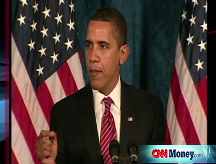Democrats mull cuts to schools in stimulus plan
GOP delivered list of proposed cuts to $79 billion fund for states to give to schools, await Democrats' response.
WASHINGTON (CNN) -- A key compromise over the $900 billion economic recovery plan entered a pivotal phase Friday, with Democrats wrestling over potential cuts to the proposal that include billions slashed from education spending.
Sen. Susan Collins, R-Maine, and other Republicans in an early morning meeting told CNN Radio that they've handed over a list of potential cuts to Democratic leaders and are waiting for a response.
"The ball's really in their court," Collins said. A few hours later she walked out of Senate Majority Leader Harry Reid's office smiling and told reporters, "We're close."
The number two Democrat in the Senate, Dick Durbin, D-Illinois, confirmed Democrats are now tackling a tough debate over cutting what they see as core programs. He singled out education as one of the largest areas of potential cuts, and one of the hardest for Democrats to swallow.
"It's a painful area for all of us as Democrats, to make these cuts in education assistance," he said.
Durbin said there are "substantial" proposed cuts to a $79 billion fund created to help states deal with the economic crisis by giving them more money for schools.
Putting more pressure on Senators was news Friday that employers slashed another 598,000 jobs off of U.S. payrolls in January, taking the unemployment rate up to 7.6%.
President Obama seized on the report to renew the push for his stimulus plan.
"I am sure that at the other end of Pennsylvania Avenue, members of the Senate are reading these same numbers," Obama said.
"I hope they share my sense of urgency and draw the same, unmistakable conclusion: The situation could not be more serious. These numbers demand action. It is inexcusable and irresponsible for any of us to get bogged down in distraction, delay, or politics as usual while millions of Americans are being put out of work.
The frenzy of meetings over the economic recovery plan have shifted into yet a higher, and more powerful gear.
White House budget director Peter Orszag left a morning meeting in Reid's office, but would not comment on negotiations. The change of location is notable. Senators who were meeting in their office buildings Thursday are now negotiating directly with Reid, the leader of the Senate, just outside the chamber doors.
As a handful of Republicans talk compromise, their former flag bearer and presidential candidate, Sen. John McCain, R-Arizona, warned that the rest of the GOP may not be on board.
"You cannot call a bill bipartisan if it has two or three or four or even five Republicans out of 535 members in Congress," McCain told the Senate floor.
The remarks seemed aimed at Friday's early meeting of five Republicans: Sens. Susan Collins, R-Maine, Lisa Murkowski, R-Alaska, Mel Martinez, R-Florida, Arlen Specter, R-Pennsylvania and George Voinovich, R-Ohio.
Those working for compromise face a parliamentary deadline. Reid has set in motion a procedure that would force a key vote on the stimulus bill by Saturday at the latest. ![]()



